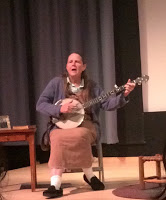Sue Massek Performs One-Woman Play “Precious Moments”
Kicking off Frostburg State University’s tenth annual Appalachian Festival this year was Si Kahn’s one-woman play, “Precious Moments,” performed Thursday night by Sue Massek.
Massek gave a heart-warming performance playing Sarah Ogan, an underrated folk musician from the 1930s whose music was known throughout Kentucky. After just losing her older sister Molly, Sarah gives a soliloquy the duration of the play, allowing the audience to know the hardships and triumphs she faced in life, and the complicated relationship she shared with her deceased sister.
With emotional narratives and authentic folk music accompanied by a banjo, the play allowed the audience to take a front row seat at a look into Appalachian culture.
The play began with the character Sarah Ogan playing a soothing tune on the banjo to accompany her even more beautiful singing. Along with her first husband, parents, and two of her children, Sarah had just lost her older sister. In a one-on-one conversation with herself, she recounted the ups and downs of her relationship with her sister. Though they shared a common love of music and it was the only way they felt bonded, it was also the thing that had the most power to tear them apart and hate one another. Almost in tears at times, angry and loud at others, and occasionally looking up with a smile while telling stories about her sister captured just how complex Sarah and Molly’s relationship was. Her sister did terrible things to her, and she often retaliated. After reading a nasty, yet comical poem she had written about her sister, the entire audience laughed.
Despite the pain, it was clear just how much Sarah loved her sister.
Just as music had the ability to unite Sarah and her sister, it did the same for the audience. The play attracted a very diverse crowd of different ages and races. After playing an upbeat song that electrified and uplifted the theater, Sarah’s character asks the audience if that was fun, to which the whole audience replied with laughter. Several songs were sung throughout the play, and occasionally there was an audience member singing along or tapping their foot to the beat.
Also captured by the play were the rough conditions that plagued this era in Appalachian culture, and the “rich tradition of music as communication,” as mentioned by the playwright, Si Kahn. Sarah recounts her father coming home from the coalmines covered in black dust, and the rough conditions he encountered daily before dying. Though tuberculosis invaded her lungs, it did not kill her unlike her first husband. Even worse than the conditions that took her father and husband’s life, were the ones that killed two of her four children who died of starvation. After funerals, Sarah said the song “Precious Moments,” was sang. It was a healing method, just like all the other songs she sang to make emotional memories more bearable.
After being asked what she expected to get out of the play, a woman named Goldie said she had, “No expectations. My husband brought me in, it was random.” Already having background knowledge on Appalachia, she said she did not know the living conditions to have been that bad. However, she was aware of music being used as a healing method, and believed that the play did a great job at capturing the musical aspect.
Following the play, the audience had the opportunity to ask Si Kahn, Sue Massek, and Dr. Gregory Wood, history professor and head of the Honors Department at Frostburg State University, any questions they had. While many inquiries about the play, Sarah Ogan, and the time period the play was set in were made, a lot of the time was spent praising Massek’s performance. The audience was captivated by her, leaving one member who met Ogan in person to say, “I think you did a great job capturing the way she sang.” The playwright too had glowing remarks on her performance. Kahn mentioned that while he was watching he thought, “I can’t believe how moving this is,” and that it “Felt like we were sitting there and you were telling me a story.”
Like Ogan, Sue Massek is also a musician. Her specialty is writing music for social justice. As an established musician, she has seven albums and has performed throughout the United States, Italy, and Canada. During the question and answer portion of the event, more insight was gained on Ogan’s career. Though her music had little recognition during the time frame the play took place, her music later became better known. The question and answer portion revealed another notable fact, that Massek and Ogan were scheduled to perform together a few days after Ogan passed away.
Through Sue Massek, Si Kahn, and the play “Precious Moments,” Sarah Ogan and the healing music she made are able to live on. The passion and power of folk music, and its role in Appalachia was brilliantly captured during the performance. Click here for upcoming events by Sue Massek and more details about her.





1 Comment